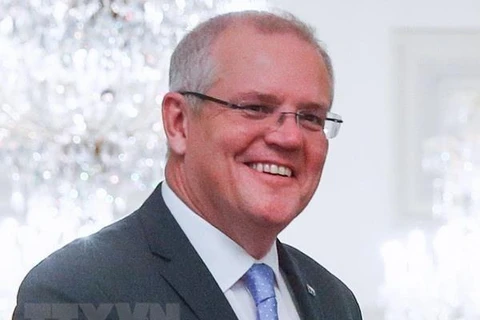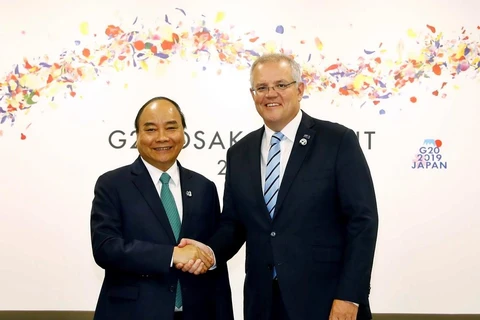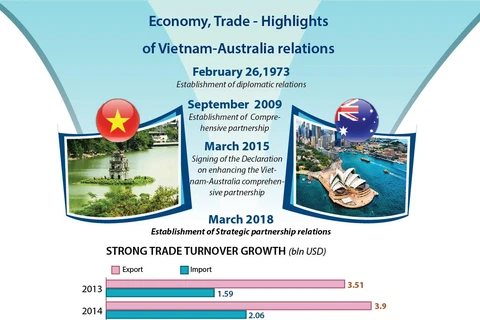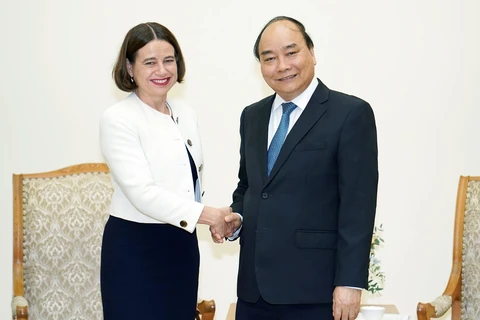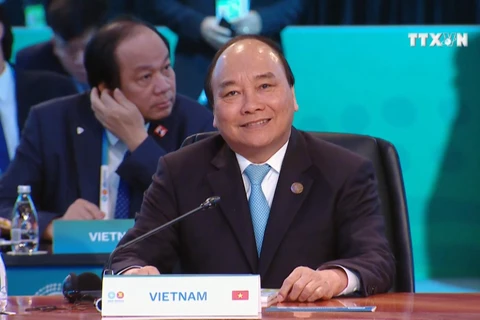 Vietnamese Prime Minister Nguyen Xuan Phuc (L) and his Australian counterpart Scott Morrison review the guard of honour at the welcome ceremony for the latter in Hanoi on August 23 (Photo: VNA)
Vietnamese Prime Minister Nguyen Xuan Phuc (L) and his Australian counterpart Scott Morrison review the guard of honour at the welcome ceremony for the latter in Hanoi on August 23 (Photo: VNA) Hanoi (VNA) - Vietnam and Australia on August 23 issued a joint statement on the occasion of the official visit to Vietnam by Australian Prime Minister Scott Morrison.
The following is the full text of the Joint Statement.
1. The Prime Ministers of Vietnam and Australia, on the occasion of Prime Minister Morrison's first official visit to Vietnam from 22 to 24 August 2019, reiterated their mutual commitment to a strong and ambitious bilateral relationship during their talks.
2. The Prime Ministers emphasised that Vietnam and Australia are strategic partners, with a shared neighbourhood and common outlook. They recognised each other’s increasing importance, both bilaterally and as partners in the Indo-Pacific as well as in the international community.
3. The Prime Ministers acknowledged that the partnership is founded on a basis of mutual respect, mutual trust, converging interests and deepening links. They agreed to increase the depth and breadth of engagement between the two countries in advance of the 50th anniversary of diplomatic relations in 2023. To this end, they agreed that Vietnam and Australia’s Plan of Action for the Strategic Partnership for the period of 2020-2023 will focus on three priority areas: enhancing economic engagement; deepening strategic, defence and security cooperation; and building knowledge and innovation partnerships. To guide this work, and as close partners and friends in the Indo-Pacific, Vietnam and Australia agreed to commence Annual Leaders’ Meetings, and reinforce the increasing engagement at the ministerial and officials’ levels.
4. Reflecting the shared commitment to building on the strategic partnership, the Prime Ministers agreed to develop an Enhanced Economic Engagement Strategy with the aim of becoming top ten trade partners and doubling investment. The Strategy will solidify shared commitment to trade liberalisation and economic connectivity, and help both countries take advantage of emerging market opportunities. This work will be led by key Economic Ministers, who will meet in Australia later this year for the inaugural Vietnam - Australia Economic Partnership Meeting to further boost the current excellent ties in bilateral trade, investment and development cooperation. Australia’s Minister for Trade, Tourism and Investment will also lead a business delegation to Vietnam in 2020. Both sides will work together to continue to facilitate market access for aquatic and agricultural products, boost two-way connectivity, collaborate on energy security and seize the digital opportunities of the future, including the digital economy and e-government. Both Prime Ministers also reaffirmed their strong commitment to uphold the rules-based multilateral trading system as embodied in the World Trade Organisation (WTO) and committed to support necessary reform of the WTO to ensure that it can continue to address the opportunities and challenges of the 21st century.
5. The Prime Ministers emphasised their commitment to promoting bilateral economic opportunities and regional economic integration through free trade agreements and cooperation in multilateral economic frameworks, including APEC. In this context, they welcomed the 10thanniversary of the Agreement Establishing the ASEAN-Australia-New Zealand Free Trade Area, and the work underway to upgrade that Agreement. They committed their governments to working together to ensure smooth implementation of the Comprehensive and Progressive Agreement for Trans-Pacific Partnership. They agreed on the importance of concluding negotiations on a modern, comprehensive, high-quality and mutually beneficial Regional Comprehensive Economic Partnership Agreement this year.
6. Australia will continue to support Vietnam’s international security contribution, including by the Australian Defence Force providing on-going specialist peacekeeping training and strategic airlift support for Vietnam’s next peacekeeping deployment. Vietnam and Australia will also hold an annual Defence High Level Meeting at ministerial level as well as a separate Security Dialogue at vice-ministerial level, building on existing bilateral defence and security mechanisms. The two countries will broaden bilateral security cooperation, including in the maritime and cyber domains, and work together to combat transnational crime in Vietnam and Australia, including through increased border security cooperation and law enforcement activities.
7. Vietnam and Australia will strengthen collaboration in knowledge and innovation, including between public services and establish a Vietnam – Australia Centre at the Ho Chi Minh National Academy of Politics. The Centre will draw on Australian expertise to support Vietnam’s future leadership, while enabling Vietnam and Australia to pursue solutions to shared national and regional challenges and deepen people-to-people and institutional links. It will bring together influential Vietnamese and Australian leaders, government officials, experts and academics.
8. The Leaders committed to protecting the health of the oceans, by reducing plastic waste, sharing technologies and expertise and improving the sustainability of fishing. Vietnam and Australia committed to increasing cooperation in these areas.
9. Both sides will encourage their respective localities to step up cooperation through the exchange of delegations at various levels and sharing of management expertise, particularly in urban planning, transport infrastructure, education and training, and innovative entrepreneurship. Vietnam welcomed Australia’s announcement that from 2 September 2019, Australia will increase the number of Work and Holiday Maker visa places for Vietnamese nationals from 200 to 1,500.
10. Building on 25 years of education and skills cooperation, the Prime Ministers agreed to extend knowledge collaboration to new areas by increasing education and research links through partnerships such as the Aus4Innovation Partnership Grants program. Both sides are committed to strengthening existing innovative partnerships between universities, research agencies, not-for-profits and businesses in Vietnam and Australia.
11. Both countries remain committed to an open, inclusive, prosperous and secure region defined by respect for international law, sovereignty, independence and territorial integrity. The Prime Ministers reaffirmed the importance of ASEAN centrality and ASEAN-led architecture, particularly the East Asia Summit. In this regard, the Prime Ministers welcomed the ASEAN Outlook on the Indo-Pacific as essential to regional cooperation. Australia committed to extending strong support to Vietnam in assuming the important role of the ASEAN Chair in 2020 and as non-permanent member of the UN Security Council in 2020-2021. Australia also reaffirmed its commitment to boosting cooperation with the countries in the Mekong sub-region in areas such as connectivity, ICT, climate change and water resources for sustainable development.
12. The Prime Ministers expressed serious concerns about developments in the South China Sea, including land reclamation and militarisation of disputed features. They also expressed concern about disruptive activities in relation to long-standing oil and gas projects in the South China Sea. They emphasised the importance of freedom of navigation and overflight, compliance with international law and maintaining a rules-based order. They called on all parties to exercise self-restraint and avoid actions that may further complicate the situation. They also reaffirmed the need for states to resolve disputes peacefully, without the threat or use of force in accordance with international law, particularly the 1982 United Nations Convention on the Law of the Sea (UNCLOS). The Prime Ministers underscored the importance of UNCLOS dispute settlement mechanisms and called upon the parties to respect and implement the decisions rendered by these mechanisms. They reiterated the importance of the full and effective implementation of the Declaration on the Conduct of Parties in the South China Sea (DOC). They called for any Code of Conduct between ASEAN and China to be fully consistent with international law, in particular UNCLOS, without prejudice to the interests of third parties or the rights of states under international law, and support existing inclusive regional architecture.
13. The talks were conducted in a candid and fruitful manner, followed by a press briefing. The Prime Ministers will brief key ministers on the positive state and direction of the Vietnam - Australia relationship for further implementation, aimed at bringing the relationship to a higher level. - VNA
VNA
